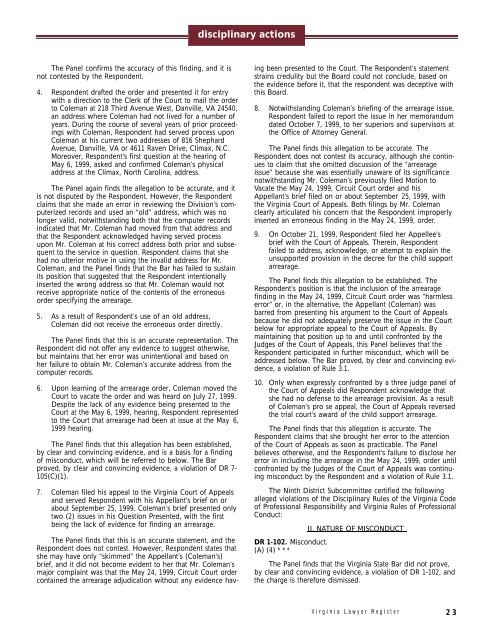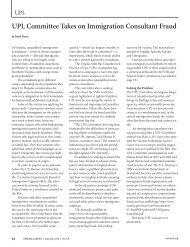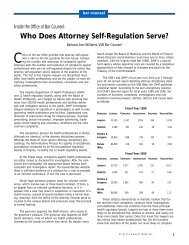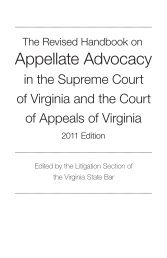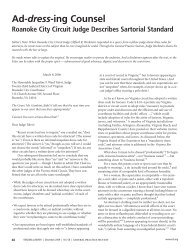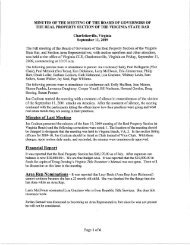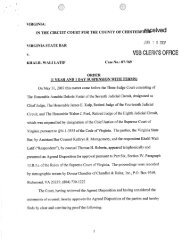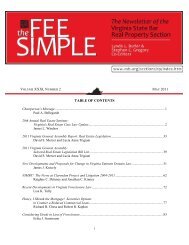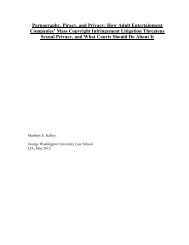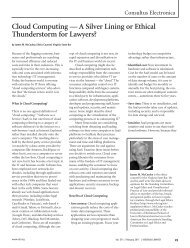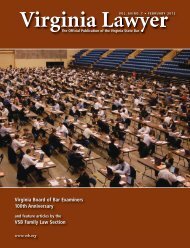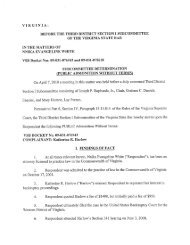Disciplinary Board Disciplinary Actions - Virginia State Bar
Disciplinary Board Disciplinary Actions - Virginia State Bar
Disciplinary Board Disciplinary Actions - Virginia State Bar
You also want an ePaper? Increase the reach of your titles
YUMPU automatically turns print PDFs into web optimized ePapers that Google loves.
The Panel confirms the accuracy of this finding, and it is<br />
not contested by the Respondent.<br />
4. Respondent drafted the order and presented it for entry<br />
with a direction to the Clerk of the Court to mail the order<br />
to Coleman at 218 Third Avenue West, Danville, VA 24540,<br />
an address where Coleman had not lived for a number of<br />
years. During the course of several years of prior proceedings<br />
with Coleman, Respondent had served process upon<br />
Coleman at his current two addresses of 816 Shephard<br />
Avenue, Danville, VA or 4611 Raven Drive, Climax, N.C.<br />
Moreover, Respondent’s first question at the hearing of<br />
May 6, 1999, asked and confirmed Coleman’s physical<br />
address at the Climax, North Carolina, address.<br />
The Panel again finds the allegation to be accurate, and it<br />
is not disputed by the Respondent. However, the Respondent<br />
claims that she made an error in reviewing the Division’s computerized<br />
records and used an “old” address, which was no<br />
longer valid, notwithstanding both that the computer records<br />
indicated that Mr. Coleman had moved from that address and<br />
that the Respondent acknowledged having served process<br />
upon Mr. Coleman at his correct address both prior and subsequent<br />
to the service in question. Respondent claims that she<br />
had no ulterior motive in using the invalid address for Mr.<br />
Coleman, and the Panel finds that the <strong>Bar</strong> has failed to sustain<br />
its position that suggested that the Respondent intentionally<br />
inserted the wrong address so that Mr. Coleman would not<br />
receive appropriate notice of the contents of the erroneous<br />
order specifying the arrearage.<br />
5. As a result of Respondent’s use of an old address,<br />
Coleman did not receive the erroneous order directly.<br />
The Panel finds that this is an accurate representation. The<br />
Respondent did not offer any evidence to suggest otherwise,<br />
but maintains that her error was unintentional and based on<br />
her failure to obtain Mr. Coleman’s accurate address from the<br />
computer records.<br />
6. Upon learning of the arrearage order, Coleman moved the<br />
Court to vacate the order and was heard on July 27, 1999.<br />
Despite the lack of any evidence being presented to the<br />
Court at the May 6, 1999, hearing, Respondent represented<br />
to the Court that arrearage had been at issue at the May 6,<br />
1999 hearing.<br />
The Panel finds that this allegation has been established,<br />
by clear and convincing evidence, and is a basis for a finding<br />
of misconduct, which will be referred to below. The <strong>Bar</strong><br />
proved, by clear and convincing evidence, a violation of DR 7-<br />
105(C)(1).<br />
7. Coleman filed his appeal to the <strong>Virginia</strong> Court of Appeals<br />
and served Respondent with his Appellant’s brief on or<br />
about September 25, 1999. Coleman’s brief presented only<br />
two (2) issues in his Question Presented, with the first<br />
being the lack of evidence for finding an arrearage.<br />
The Panel finds that this is an accurate statement, and the<br />
Respondent does not contest. However, Respondent states that<br />
she may have only “skimmed” the Appellant’s (Coleman’s)<br />
brief, and it did not become evident to her that Mr. Coleman’s<br />
major complaint was that the May 24, 1999, Circuit Court order<br />
contained the arrearage adjudication without any evidence hav-<br />
disciplinary actions<br />
ing been presented to the Court. The Respondent’s statement<br />
strains credulity but the <strong>Board</strong> could not conclude, based on<br />
the evidence before it, that the respondent was deceptive with<br />
this <strong>Board</strong>.<br />
8. Notwithstanding Coleman’s briefing of the arrearage issue,<br />
Respondent failed to report the issue in her memorandum<br />
dated October 7, 1999, to her superiors and supervisors at<br />
the Office of Attorney General.<br />
The Panel finds this allegation to be accurate. The<br />
Respondent does not contest its accuracy, although she continues<br />
to claim that she omitted discussion of the “arrearage<br />
issue” because she was essentially unaware of its significance<br />
notwithstanding Mr. Coleman’s previously filed Motion to<br />
Vacate the May 24, 1999, Circuit Court order and his<br />
Appellant’s brief filed on or about September 25, 1999, with<br />
the <strong>Virginia</strong> Court of Appeals. Both filings by Mr. Coleman<br />
clearly articulated his concern that the Respondent improperly<br />
inserted an erroneous finding in the May 24, 1999, order.<br />
9. On October 21, 1999, Respondent filed her Appellee’s<br />
brief with the Court of Appeals. Therein, Respondent<br />
failed to address, acknowledge, or attempt to explain the<br />
unsupported provision in the decree for the child support<br />
arrearage.<br />
The Panel finds this allegation to be established. The<br />
Respondent’s position is that the inclusion of the arrearage<br />
finding in the May 24, 1999, Circuit Court order was “harmless<br />
error” or, in the alternative, the Appellant (Coleman) was<br />
barred from presenting his argument to the Court of Appeals<br />
because he did not adequately preserve the issue in the Court<br />
below for appropriate appeal to the Court of Appeals. By<br />
maintaining that position up to and until confronted by the<br />
Judges of the Court of Appeals, this Panel believes that the<br />
Respondent participated in further misconduct, which will be<br />
addressed below. The <strong>Bar</strong> proved, by clear and convincing evidence,<br />
a violation of Rule 3.1.<br />
10. Only when expressly confronted by a three judge panel of<br />
the Court of Appeals did Respondent acknowledge that<br />
she had no defense to the arrearage provision. As a result<br />
of Coleman’s pro se appeal, the Court of Appeals reversed<br />
the trial court’s award of the child support arrearage.<br />
The Panel finds that this allegation is accurate. The<br />
Respondent claims that she brought her error to the attention<br />
of the Court of Appeals as soon as practicable. The Panel<br />
believes otherwise, and the Respondent’s failure to disclose her<br />
error in including the arrearage in the May 24, 1999, order until<br />
confronted by the Judges of the Court of Appeals was continuing<br />
misconduct by the Respondent and a violation of Rule 3.1.<br />
The Ninth District Subcommittee certified the following<br />
alleged violations of the <strong>Disciplinary</strong> Rules of the <strong>Virginia</strong> Code<br />
of Professional Responsibility and <strong>Virginia</strong> Rules of Professional<br />
Conduct:<br />
DR 1-102. Misconduct.<br />
(A) (4) * * *<br />
II. NATURE OF MISCONDUCT<br />
The Panel finds that the <strong>Virginia</strong> <strong>State</strong> <strong>Bar</strong> did not prove,<br />
by clear and convincing evidence, a violation of DR 1-102, and<br />
the charge is therefore dismissed.<br />
V i r g i n i a L a w y e r R e g i s t e r 2 3


